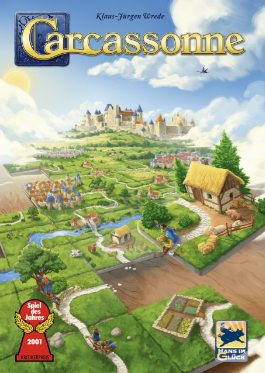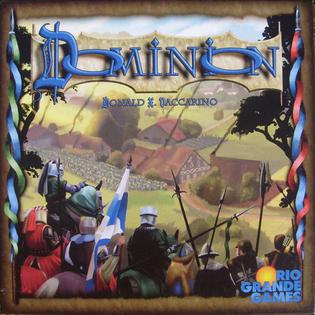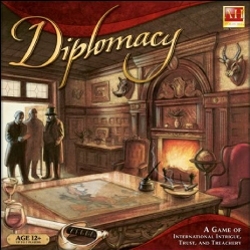Ruin Your Friendships with Board Games and Metal

Are you a socially awkward metalhead whose only relationships are with strangers on some weird, potentially poop-fetish site on the internet? This post isn’t for you. If, however, you have real, breathing and bleeding friends beyond the realm of cyberspace, this post is for you. If you have no friends but would like to acquire friends, this post may be for you.
If you do have friends, you’ve likely realized that some of them need something more than booze to grease the wheels of social interaction. Some normies need something far more stimulating than a beer and heated conversation about the minutiae of extreme music subgenres. Enter board games. These neat contraptions allow you to talk shop, drink beer, and test the depths of your friendships with the normies all at the same time. What a deal!
“But there are so many board games out there, Dubs,” you may be wondering. “Which ones are the absolute best, and what albums should I play while torturing my friends?” I’m glad you asked. In this post, I’ve collected an assortment of some of the best board games around, ranked by play time, strategic depth, and ability to demolish relationships. However, I’ve also included a suggested album for each game since I know you can’t spend much time with normies without getting that sweet brutality injected into your ears.
Acquire (1962)
Number of players: 3-6
Duration: 1.5 hours
Strategic Depth: 4/5
Chance to Ruin Relationships: 2/5
Acquire is the game of corporate greed. It is to Monopoly what Mgla is to Dimmu Borgir. Acquire requires cutthroat action and ruthless strategy at a far greater depth than many of the other games on this list. The goal is to make more money than anyone else by acquiring stock in hotel chains as new chains are opened across the board. The only way to make money is through mergers, and you want to absolutely ensure you are the majority shareholder of the smaller chain being absorbed or of the largest chain at the end of the game. Though there’s a bit of luck in which tiles you draw, this small amount of chance is offset by how you grow different hotels and which mergers you cause (or prevent in order to stifle your friends’ ability to make money). The game rewards forethought and careful planning, and for that reason, you may need a couple plays before you really get the hang of it.
Since this is a game of corporate greed, we’re going to channel Howard Beale’s “Mad as hell” speech from Network and jam Mouth of the Architect.
Side Note: If you ever stumble across the 1960s version of the game for cheap, buy it. It can be pretty expensive.
_____________________
Carcassonne (2000)
Number of players: 2-5 (6-8 with expansion)
Duration: 0.5-1.5 hours
Strategic Depth: 2/5
Chance to Ruin Relationships: 2/5
Carcassonne is a game of strategic tile placement named after a medieval fortified city in France. The object of the game is to carefully place a landscape tile in order to amass followers in varying types of features: roads, cities, fields, and cloisters. You amass points for completing new features, and at the end of the game, points are added together based on followers in each feature type. The strategic depth of the game comes from choosing ideal tile placements so that you gain more followers than your opponents. Features can be shared between players, though, so this game requires less scheming than some of the others on this list. That fact, plus the relatively short duration, makes it one of the more benign entries on this list that you may wish to consider if you’re seeking fun rather than a fistfight.
Since Carcassonne takes you back to a time of vassal states and corrupt land owners, I can think of no better soundtrack than the dungeon synth composed by our good friend Sequestered Keep. Now get thee to a nunnery.
_____________________
King of Tokyo (2011)
Number of players: 2-6
Duration: 0.5 hours
Strategic Depth: 2/5
Chance to Ruin Relationships: 2/5
King of Tokyo is a fast and frantic game all about giant, brawling Kaiju. The objective of this game is to acquire 20 victory points before any of your fellow monsters, and there are a handful of ways to do this. The biggest payback comes from occupying Tokyo; while there, you automatically gain victory points for your occupation every time your turn comes around. Alternatively, you can try to amass victory points through dice rolls or by purchasing special cards. Players take turns rolling six dice up to three times in order to choose between victory points, attacks, or energy. Good strategy requires a balance between these three roll types. Should you hoard energy to purchase cards that may make you a more powerful monster, or should you, as a monster outside Tokyo, just pummel the occupier until that Kaiju is dead? One of the trickiest elements of the game is that players outside Tokyo all only attack those inside Tokyo, and vice versa. The occupier may cede Tokyo to an attacking monster, thereby sacrificing potential victory points at the gain of healing and less attacks. In general, games go too quickly for players to develop grudges. My brothers-in-law, however, almost came to blows over the effect of a poison card, so tread carefully.
Since this game is all about giant monsters murdering each other to claim dominion over a major city, you’re going to need something short, burly, and heavy as all hell. Kongh should do the trick. They even have a grumpy gorilla on the cover. It’s perfect.
_____________________
Ticket to Ride (2004)
Number of players: 2-5
Duration: 0.75-1.5 hours
Strategic Depth: 3/5
Chance to Ruin Relationships: 4/5
Ticket to ride is the perfect game for you globetrotting adventurous types. The game board is a map, and the primary objective is to traverse across that map, linking together routes in order to reach a final, secret destination (or two). At the beginning of the game, each player draws destination ticket cards and must keep at least two of these for the end game. Points are awarded by securing routes to your destinations with plastic train pieces as you draw and play railway car cards. The strategic key to this game is to keep your final destination a secret and to use sleight of hand to deceive the other players regarding your ultimate goal. Players who reach their destination(s) earn even more points, so stretch those rails as long as possible! This game can be extremely frustrating if other players steal a route you need without it even being critical to their destinations. I’ve seen marriages get put on the rocks due to this game. It’s incredibly fun but can be incredibly obnoxious if you invite that one friend who just likes to troll people.
Although there are a number of different versions of this game, I’ve featured the European edition here, so let’s take it back to the old country with some classic tunes from Accept.
_____________________
Catan: Cities and Knights (1998)
Number of players: 3-4 (5-6 expanded)
Duration: 3 hours
Strategic Depth: 4/5
Chance to Ruin Relationships: 4/5
Vanilla Catan is boring, so let’s focus on the far superior Cities and Knights expansion. Although it mostly follows the rules of basic Catan and the previous Sefarers expansion, it adds in enough unique elements to provide a distinct experience from its predecessor. The goal of Cities and Knights is to be the first to acquire 13 victory points. There are a few ways to do so. First, you can use your resource cards to construct settlements or to upgrade your settlements to cities. Cities will net you the highly prized (and new from vanilla Catan) commodity cards that enable you to upgrade your calendar, snag progress cards, and develop toward a metropolis, so these are a must. Second, the progress cards, gained through lucky rolls of the dice after you’ve upgraded your calendar, can gain you extra victory points. Third, you can stave off barbarian invasions (controlled by fateful rolls of the dice) by fielding more knights than other players, earning you more sweet victory points. Fourth, the prize for connecting the longest road network remains intact from vanilla Catan, so using your brick and wood to lay down a groove is still a viable option. Last, and most impressive, is being the first to convert your city into a metropolis, thereby cementing your glory over the plebeian competitors whose cities got razed in the first barbarian attack. Those familiar with Catan have likely noticed a number of differences from the base model already, but the extra strategic depth to this expansion comes from the need for wheat/sheep/stone to field and activate knights. Keeping knights in the field will keep your cities from being leveled, allowing you to acquire more commodities and to upgrade your calendar more quickly. Gearing toward these resources while not neglecting wood and brick changes things up quite a bit, so if you’re used to the base model, you’ll want to rethink your initial placements. As always, the dice can be against you. Even more frustrating, though, is when one of your dillhole competitors deactivates a knight at the last moment, forfeiting Catan’s defense so that everyone else’s cities get burned. Everyone hates that guy. Don’t be that guy. For optimal fun, I suggest playing with a total of four people and with the 5-6 player expansion. Buying all of the Catan sets to build up to that expansion will cost you a lot of cheddar, though, so you may need to budget.
Since this game features a looming threat from barbarians, I suggest you get down with Doomsword. Just play all of their albums and laugh as the peasants are tormented.
Side Note: Don’t ever trade anything. Ever.
_____________________
Pandemic (2007)
Number of players: 2-4
Duration: 0.75 hours
Strategic Depth: 4/5
Chance to Ruin Relationships: 0/5
Pandemic is one of the most interesting selections on this list because rather than playing against each other, players must cooperate to beat the board. Each player fills a distinct role: researcher, doctor, soldier, etc. These particular roles offer various benefits, such as the ability to cure all outbreaks in a city or to travel to research centers quickly, and players must coordinate to take advantage of these talents to combat the immense odds stacked against them. And trust me, the odds are bad. There are a lot of ways to lose in Pandemic. If seven outbreaks occur, all disease cubes of a particular color run out, or all player cards are drawn, the game is over. If, however, you manage to travel the world, preventing all outbreaks and curing all four diseases threatening to wipe out humanity, you and your teammates win. It’s a difficult goal to accomplish, but the reward for pulling off great teamwork and strategy is well worth it.
Since you’ll be facing the last days of humanity, why not go whole hog and jam out to some brutal death metal via Pathology.
_____________________
Dominion (2008)
Number of players: 2-4 (up to 6 with intrigue expansion)
Duration: 0.5 hours
Strategic Depth: 4/5
Chance to Ruin Relationships: 3/5
I might be cheating a bit by including Dominion on a list of board games as there is no board to be found, but oh well. Dominion is a kooky little card game that you might get if you spliced Catan with Magic; the goal is to strategically build a deck of cards in order to gain victory cards. How you build your deck, though, is entirely up to you. The base version of the game comes with 25 different types of Kingdom cards (your action cards that can allow you to mine for more treasure cards that you need to purchase victory cards, to draw more cards, or to curse other players), but any one game only uses 10 of those 25 types. Therefore, there is a huge variety to the types of cards that can deployed, and crafty players will find unique card combinations that allow them to string together card draws, reshuffles, purchases, and treasure acquisition in order to gain victory points faster. Each turn consists of playing one action card (unless that card grants you more actions) from the five cards in your hand, purchasing one card with the treasure cards in your hand (unless you gain extra purchases), and discarding unused cards. All discarded cards eventually make their way back into your deck, so unless you have an action that allows you to trash a worthless card, you need to strategically balance acquiring low value cards and high value cards. This game would get one more point for strategic depth if it didn’t rely on luck of the draw as much. It can also be completely non-combative unless you’re playing with curse cards. If that’s the case, things get heinous quickly. There are a number of expansions available that can add even more depth to your experience.
Since there’s no way to not feel like a total goober playing a Magic-esque card game, let’s go full dork and jam some power metal while we strive for dominion. I think Cellador will do nicely.
_____________________
Mexican Train (Dominoes)
Number of players: 2-6
Duration: 2.0-3.0 hours
Strategic Depth: 3/5
Chance to Ruin Relationships: 4/5
Ah, Mexican Train, the great scourge of relationships in the House of W. This Domino variant has been a staple of holiday gatherings in my family for years and years, and I’ve recently been subjecting introducing my friends here in Texas to its glory. On the surface, it’s a pretty simple game. Every player draws twelve dominoes, each with two sides indicating different numbers, and takes turn playing dominoes on their trains until one player clears his or her hand. There are 91 dominoes in a set, with numbers ranging from twelve to zero. The player who draws the double domino of the number of that round (beginning with twelve and counting down to zero) starts the play and may establish his or her own train or the Mexican train. trains are built by connecting domino ends of the same number. The trick to playing though is to use doubles strategically; if a double is played, it must be satisfied, either by you or the next player if you don’t have a domino of that number. You can use doubles to play two dominoes at a time, quickly working through your hand, or to trainwreck your neighbor’s set; if you cannot play, your train becomes public, allowing anyone to play on it and potentially ruin your strategy. Bitter tears have been wept over unsatisfied doubles.
If the dominoes just aren’t turning up for you, you’ll likely find your sanity running off the rails (huehuehue). Perhaps you’re riding a ‘Crazy Train”?
_____________________
Diplomacy (1954)
Number of players: 2-7
Duration: 12.0 hours
Strategic Depth: 5/5
Chance to Ruin Relationships: 5/5
This is it, the ultimate strategic game for crushing your friends and ruining your relationships. There are no dice or random draws in this game, just cold, ruthless intrigue. The goal of diplomacy is to negotiate your units, on land and by sea, into territories across Europe to acquire supply centers. Each round is conducted in two sets of three phases. First is the long negotiation phase. Diplomacy, unlike most games, places a heavy emphasis on, well, diplomacy. It is in your interest to talk to the other players, secretly or within earshot, in order to forge alliances, manipulate each other, and betray your allies. You typically want to play the long con here; keep allies around until they no longer benefit you. After the negotiations conclude (how long this take depends on what sort of timer, if any, you set), every player writes his moves secretly on a slip of paper and turns these into the game master. The rules are then read aloud, and the deceit and betrayals are laid bare. It takes a greater number of units than occupying forces to take a territory, so if your ally unexpectedly pulled out his fleet to move on a different territory, you’re suddenly up a creek. If you can hang onto a new territory for two cycles, it is yours, rewarding you with a new unit. There are 34 supply centers in total, and controlling 18 will earn you the victory. Losing all your supply centers due to the machinations of the backstabbing bastards you used to trust, though, will eject you from the game. If you want a game that requires extreme planning, cunning, and subterfuge, grab your knife and find a friendly back to stab; Diplomacy is probably the game for you.
Diplomacy is a purely cerebral test of guile and wit. To that end, only intelligent, intricate music will suffice. Listen to Cult of Luna‘s discography on repeat.
What’s your favorite board game? Do you have any gaming traditions in your home? Let me know in the comments below.
(Photos VIA, VIA, VIA, VIA, VIA, VIA, VIA, VIA, VIA, VIA, VIA, VIA, VIA, VIA, VIA, and VIA)

























